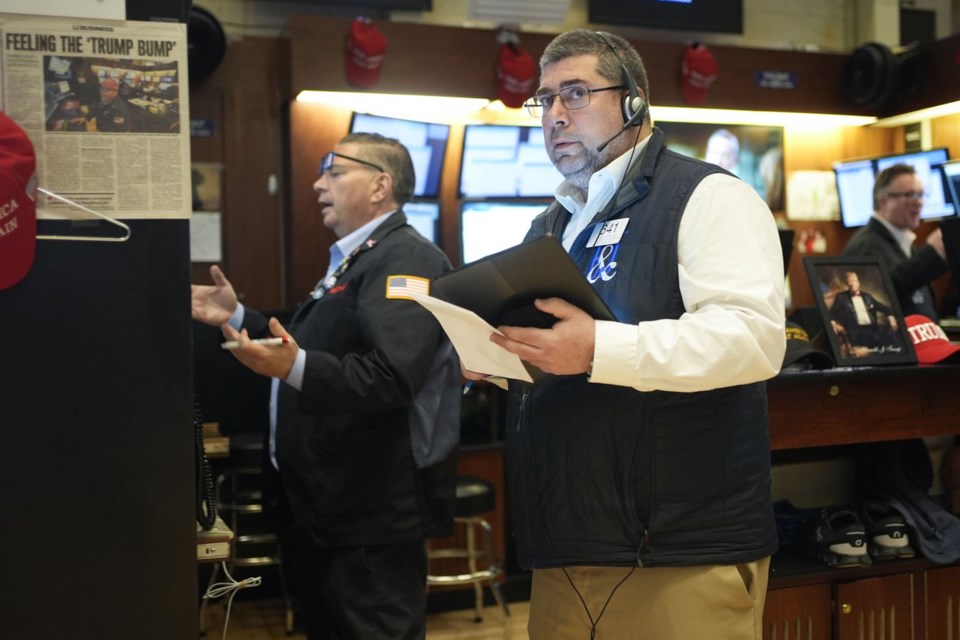NEW YORK (AP) — Some calm is returning to Wall Street, and U.S. stock indexes are making only modest moves after much of Europe and Asia rose earlier in the day. The S&P 500 was little changed in early trading Tuesday, a day after swinging sharply on worries that President Donald Trump’s tariffs could spark a punishing trade war that would hurt economies around the world, including the United States. The Dow Jones Industrial Average was down 45 points, or 0.1%, and the Nasdaq composite was up 0.3%. Trump on Monday agreed to delay his tariffs on Canada and Mexico for a month.
THIS IS A BREAKING NEWS UPDATE. AP’s earlier story follows below.
(AP) — Wall Street was mixed in light trading early Tuesday as anxiety dissipated somewhat after President Donald Trump agreed to a 30-day pause on his tariff threats against Mexico and Canada. Trump's imposed tariffs on China remained in place.
Futures for the S&P 500 inched up 0.1% before the bell, while futures for the Dow Jones Industrial Average were off by 0.1%. The technology-heavy Nasdaq rose 0.3%.
Trump delayed new tariffs on Mexico and Canada after America’s two largest trading partners took steps to appease his concerns about border security and drug trafficking.
Trump could easily renew his vow to impose tariffs on the nation's North American neighbors and already plans to announce taxes on imports from the European Union. While it appears a global economic crisis has been averted this week, markets remain on edge.
Helping to lift the Nasdaq was Palantir Technologies, which soared 22% after it beat Wall Street's fourth-quarter sales and profit targets. The Denver company also issued strong guidance for the coming year, well ahead of analysts' projections. In a letter to shareholders, CEO Alexander Karp said Palantir's revenue from government contracts grew 45% year-over-year in the fourth quarter and called the company he co-founded a “software juggernaut.”
PepsiCo fell more than 2% after it said North American demand for its snacks and drinks remained weak, leading to a second straight quarterly decline in sales. The company has raised prices repeatedly and did so again the most recent quarter, sending some customers in search of cheaper snack brands.
Shares of pharmaceutical giant Merck tumbled more than 8% after it beat sales and profit forecasts but issued a tepid outlook.
Companies reporting after the closing bell Tuesday include Google parent company Alphabet and Chipotle.
Also later Tuesday, the U.S. government issues its report on job openings and labor turnover for December.
Asian shares climbed on Tuesday even as U.S. tariffs on China came into effect and China imposed retaliatory measures on the United States, including tariffs on coal and liquefied natural gas as well as an antitrust probe into Google.
Stocks across Asia-Pacific were mostly up. The Hang Seng Index in Hong Kong closed up 2.83% to 20,789.96. Japan’s benchmark Nikkei 225 was up 0.72% to 38,798.37, while South Korea’s Kospi grew 1.13% to 2,481.69. Australia’s S&P/ASX 200 declined 0.06% to 8374.00.
The White House earlier said Trump would speak with Chinese President Xi Jinping as soon as this week, sparking hopes that a deal could be reached that could avert a broader trade war.
Trump last week imposed 10% tariffs on Chinese goods that came into effect on Tuesday. Minutes after the tariffs took effect, China launched a flurry of retaliatory countermeasures, including a 15% tariff on coal and liquefied natural gas products as well as a 10% tariff on crude oil, agricultural machinery and large-engine cars imported from the U.S.
China's tariffs are scheduled to go into effect next Monday.
Beijing also launched an antitrust probe into Google and placed two American companies on an unreliable entities list: PVH Group, which owns Calvin Klein and Tommy Hilfiger, and Illumina, a biotechnology company with offices in China. The listing bars them from engaging in China-related import or export activities and from making new investments in the country.
Earlier, Asian shares had risen following news that Canada and Mexico had negotiated with the U.S. for a one-month reprieve on 25% tariffs.
Analysts said that early trading Tuesday was driven by the postponement of tariffs on those countries.
“The sharp pullback in the U.S. dollar, along with tariff relief hopes, are likely to see markets retain their gains, barring any unexpected souring in U.S.-China talks ahead,” said Yeap Jun Rong, market strategist at IG in a note.
Yeap said that the postponement of the tariffs provides immediate relief for risk sentiments and underscores "Trump’s willingness to negotiate, potentially with tariff moves as bargaining chips rather than firm policy decisions.”
In midday European trading, France’s CAC 40 rose 0.3%, while Germany’s DAX gained 0.2%. Britain’s FTSE 100 was down 0.2%.
Benchmark U.S. crude declined $1.76 to $71.40 a barrel. Brent crude, the international standard, lost $1.16 to $74.80 a barrel.
The dollar edged up to 155.34 Japanese yen from 154.75. The euro cost $1.0334, down from $1.0345.
Zen Soo And Matt Ott, The Associated Press



